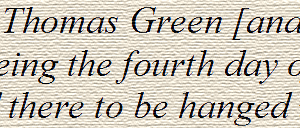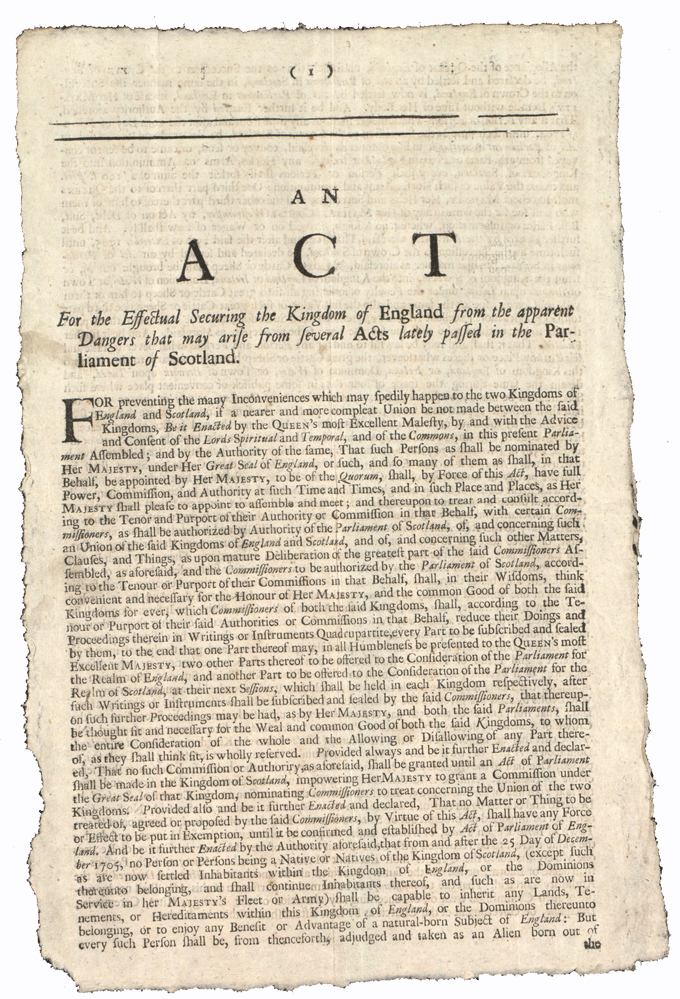| | Home | Resources | Schools Programme | Teachers | Site help | About us | Contact us | |
| You are here: Home > Resources >The Union of 1707 > Scotland 1689 - 1707 |
 Relations WorsenKing William’s proposal for a parliamentary union came to nothing, but a few months later a crisis in the succession to the throne provoked a series of hostile acts by both Parliaments that ultimately led to a union happening. Act anent Peace and War, 1703 | ||||
The SuccessionWilliam and Mary were childless so, after their deaths, the throne was to pass to Mary’s sister, Anne, and her heirs. In 1701, after the last of Anne’s surviving children died, the English Parliament passed the Act of Settlement to ensure a protestant monarch. The strongest claimants to the throne by blood were Roman Catholic but they were not allowed to inherit because of their religion. Under the English Act, it was decided that on Anne’s death the throne should pass to Princess Sophia of Hanover who was descended from James VI and I. Angry at not being consulted, the Scottish Parliament passed two acts asserting their right to decide Scotland’s future. | ||||
Act anent Peace and War, 1703As a reaction to being brought into England’s war with France over the succession to the Spanish throne, the Scottish Parliament passed the Act anent Peace and War which declared Scotland’s intention to pursue her own foreign policy and not be dragged into further European wars by England. | ||||
The Act of Security, 1704This act stated that unless Scotland was granted freedom of trade, Parliament would settle the British succession on a different monarch from England. From the English point of view, these acts opened up the possible return of a Stuart king to the throne and a stronger alliance between France and Scotland against England. Extract from the Act of Security: … upon the said Death of Her Majesty, without Heirs of her Body… the foresaid Estates of Parliament… are hereby Authorized and Impowered, to Nominate and Declare the Successor to the Imperial Crown of this Realm, and to Settle the succession therof… being always of the Royal Line of Scotland and of the true Protestant Religion. Providing always that the same be not successors to the Crown of England, unless… there be such conditions of Government settled as may secure the Honour and Sovereignty of this Crown and Kingdom; the Freedom, Frequency and Power of Parliament; Religion; and Liberty and Trade of the Nation from English or any Forreign Influence… (National Records of Scotland, Hamilton papers, GD406/M1/2/247/3/1) | ||||
The Alien Act, 1705The English Parliament retaliated in February 1705 by passing the Alien Act which threatened to treat Scots in England as aliens and prevent them from holding property there unless Scotland recognised the Hanoverian succession. The act also set out to ban exports of major Scottish products - cattle, sheep, coal or linen – to English markets unless the Scottish Parliament entered into negotiations for union by December 1705. An Act For the Effectual Securing the Kingdom of England from the apparent Dangers that may arise from several Acts lately passed in the Parliament of Scotland. … that from and after the 25 day of December 1705, no Person or Persons being a Native or Natives of the Kingdom of Scotland… shall be capable to inherit any Lands... within this Kingdom of England ... or to enjoy any Benefit or Advantage of a natural-born Subject of England: But every such Person shall be from henceforth adjudged and taken as an Alien born out of the allegiance of the Queen of England, until such time as the Succession to the Crown of Scotland, be declared and settled by an Act of Parliament in Scotland… 
(National Records of Scotland, Hamilton papers, GD406/M1/247/1) | ||||
The Worcester Affair, 1705Despite the failure of the colony at Darien, the Company of Scotland continued to trade. The ship, the Speedwell, was sent to trade in Macao, the Portuguese colony in China. She came to grief in October 1701 in the straits of Malacca, but the cargo was salvaged. When news of the ship’s fate finally reached Edinburgh in 1703, the directors chartered the Annandale to retrieve the cargo. Before the ship could leave, the rival and well-established East India Company seized her on the grounds that she was breaching their company charter and monopoly in trade. The Company of Scotland demanded their ship’s return. The case was argued for many weeks before the English Court of Exchequer but the Annandale remained with the East India Company. The seizure of the Annandale increased ill feeling in Scotland. In July 1704 an English ship, the Worcester, anchored at Leith. The directors of the Company of Scotland, thinking she was an East India Company ship, seized her in exchange for the Annandale. Suspicions were aroused that she had played a part in the loss of another Company ship, the Speedy Return, off the coast of Africa in 1703. In September 1704, Captain Green and the crew of the Worcester were arrested and charged with piracy and murder. The Admiralty Court jury consisted of Edinburgh merchants and sea captains, some of whom were shareholders in the Company of Scotland. In March 1705, despite a lack of evidence against them, Green and two of his men were found guilty and sentenced to death. Attempts to have them reprieved fell through, even though Queen Anne intervened. The sailors were hanged two months after the Alien Act was passed. Their deaths caused a storm of protest in England. Anglo-Scottish relations had reached a serious political and economic crisis. Death Sentence (National Records of Scotland, Admiralty Court criminal records, AC16/1) | ||||
|
|